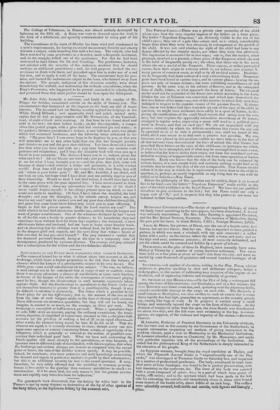SPECULATING IN THE FUNDS MORE nazaanous THAN COMMON GAMBLING. —The
excess of hazard lies in what is seldom taken into account at all, the brokerage, which bears a higher proportion to the risk than the balance of chances which the keeper of a gaming-table secures in his own favour. The Globe gives some useful calculations on the subject. "No one, we believe, is mad enough not to be convinced that at rouge et noir or roulette, where there is on every adventure a chance of one-fortieth, or some such fraction, in favour of the keeper of the table, the consequence of continued playing must be loss, though the disadvantage in each instance, separately taken, appears slight. Bat the disadvantage to speculators in the Funds (who are not themselves brokers) is greater than at a gambling-table, though it may be difficult to calculate it accurately. The stakes which a gambler in the Funds plays for are the differences; that is, the amount of the rise or fall from the time of each bargain made, to the time of closing each account. These differences are uncertain quantities, but they will not be found, we imna,giue, to amount to so much, on the average, as three per cent. The brokerage is one-eighth or half-a-crown per cent. When a speculator buys or sells 100/. stock on account, paying the ordinary commission, the transaction, therefore, if siinplitied in expression, amounts to this ;—he gives halfa-crown for the privilege of making a bet of 3/. on an equal chance—in other words, the chances being equal, he bets 3/. 23.6d. to 3/. That the chances are equal, it is scarcely necessary to show, though every one acts upon some opinion or conceit concerning future events, or superiority of intelligence, which is generally as rational as the notions of gamblers concerning their individual good luck. What we have said concerning the Funds applies still more strongly to the speculations, or time bargains, of ignorant men in different kinds of merchandise, with this exception, that when the brokerage and certain charges are heavier as compared with the casual gains or losses, the ruin of the dabbler is more speedy. It may be possible, indeed, for merchants, who have extensive and early knowledge concerning the demand and supply in particular markets, to profit by their information; but this is an additional security for loss to the casual spectator. It may, therefore, be very safely affirmed that the gambling at common gaminghouses is less unfair to the gambler than common speculations in stocks or merchandise. If it be more fatal, the only reason is that the greater excitement and rapidity may leave less time for reflection."


















 Previous page
Previous page